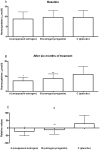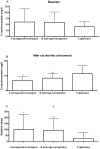What is the influence of hormone therapy on homocysteine and crp levels in postmenopausal women?
- PMID: 25789519
- PMCID: PMC4424426
- DOI: 10.6061/clinics/2015(02)07
What is the influence of hormone therapy on homocysteine and crp levels in postmenopausal women?
Erratum in
-
Errata.Clinics (Sao Paulo). 2015 Mar;70(3):228. doi: 10.6061/clinics/2015(3)13. Epub 2015 Mar 1. Clinics (Sao Paulo). 2015. PMID: 26017656 Free PMC article. No abstract available.
Abstract
Objective: To evaluate the influence of estrogen therapy and estrogen-progestin therapy on homocysteine and C-reactive protein levels in postmenopausal women.
Methods: In total, 99 postmenopausal women were included in this double-blind, randomized clinical trial and divided into three groups: Group A used estrogen therapy alone (2.0 mg of 17β-estradiol), Group B received estrogen-progestin therapy (2.0 mg of 17 β-estradiol +1.0 mg of norethisterone acetate) and Group C received a placebo (control). The length of treatment was six months. Serum measurements of homocysteine and C-reactive protein were carried out prior to the onset of treatment and following six months of therapy.
Results: After six months of treatment, there was a 20.7% reduction in homocysteine levels and a 100.5% increase in C-reactive protein levels in the group of women who used estrogen therapy. With respect to the estrogen-progestin group, there was a 12.2% decrease in homocysteine levels and a 93.5% increase in C-reactive protein levels.
Conclusion: Our data suggested that hormone therapy (unopposed estrogen or estrogen associated with progestin) may have a positive influence on decreasing cardiovascular risk due to a significant reduction in homocysteine levels.
Conflict of interest statement
No potential conflict of interest was reported.
Figures


Similar articles
-
The effect of the phytoestrogen genistein and hormone replacement therapy on homocysteine and C-reactive protein level in postmenopausal women.Acta Obstet Gynecol Scand. 2005 May;84(5):474-7. doi: 10.1111/j.0001-6349.2005.00661.x. Acta Obstet Gynecol Scand. 2005. PMID: 15842212 Clinical Trial.
-
Effects of continuous estrogen and estrogen-progestin replacement regimens on cardiovascular risk markers in postmenopausal women.Arch Intern Med. 2000 Nov 27;160(21):3315-25. doi: 10.1001/archinte.160.21.3315. Arch Intern Med. 2000. PMID: 11088095 Clinical Trial.
-
Hormone replacement therapy: estrogen and progestin effects on plasma C-reactive protein concentrations.Am J Obstet Gynecol. 2002 May;186(5):969-77. doi: 10.1067/mob.2002.122414. Am J Obstet Gynecol. 2002. PMID: 12015523
-
Effects of hormone therapy on C-reactive protein and IL-6 in postmenopausal women: a review article.Climacteric. 2005 Dec;8(4):317-26. doi: 10.1080/13697130500345109. Climacteric. 2005. PMID: 16390766 Review.
-
Comparative cardiovascular effects of different progestins in menopause.Int J Fertil Womens Med. 2001 Sep-Oct;46(5):248-56. Int J Fertil Womens Med. 2001. PMID: 11720197 Review.
Cited by
-
Are monocyte-to-HDL and C-reactive protein-to-albumin ratios useful for the diagnosis and follow-up of Takayasu arteritis?Rev Assoc Med Bras (1992). 2024 May 17;70(5):e20231683. doi: 10.1590/1806-9282.20231683. eCollection 2024. Rev Assoc Med Bras (1992). 2024. PMID: 38775535 Free PMC article.
-
Distribution and Determinants of Plasma Homocysteine Levels in a Preconception Population: A Retrospective Single-Center Study.Med Sci Monit. 2022 Oct 21;28:e937987. doi: 10.12659/MSM.937987. Med Sci Monit. 2022. PMID: 36266935 Free PMC article.
-
Serum metabolomic profiles associated with postmenopausal hormone use.Metabolomics. 2018 Jul 6;14(7):97. doi: 10.1007/s11306-018-1393-1. Metabolomics. 2018. PMID: 30830410
-
Neuroprotective and neurotoxic outcomes of androgens and estrogens in an oxidative stress environment.Biol Sex Differ. 2020 Mar 29;11(1):12. doi: 10.1186/s13293-020-0283-1. Biol Sex Differ. 2020. PMID: 32223745 Free PMC article.
-
The longitudinal relation of inflammation to incidence of vasomotor symptoms.Menopause. 2022 Aug 1;29(8):894-904. doi: 10.1097/GME.0000000000002005. Menopause. 2022. PMID: 35905469 Free PMC article.
References
-
- United Nations Department of Economic and Social Affairs Population Division World Population Ageing: 1950–2050. Accessed on November 12, 2014. Available online: http://www.un.org/esa/population/publications/worldageing19502050/
-
- Bagnoli VR, Fonseca AM, Arie WM, Das Neves EM, Azevedo RS, Sorpreso IC, et al. Metabolic disorder and obesity in 5027 Brazilian postmenopausal women. Gynecol Endocrinol. 2014;30(10):717–20. - PubMed
-
- Bush TL, Barrett-Connor E, Cowan LD, Criqui MH, Wallace RB, Suchindran CM, et al. Cardiovascular mortality and noncontraceptive use of estrogen in women: Results from the Lipid Research Clinics Program Follow-up Study. Circulation. 1987;75(6):1102–09. - PubMed
-
- Stamfer MJ, Colditz GA, Willett WC. Postmenopausal estrogen therapy and cardiovascular disease. Ten-year follow-up from the Nurses' Health Study. N Engl J Med. 1991;325(11):756–62. - PubMed
Publication types
MeSH terms
Substances
LinkOut - more resources
Full Text Sources
Other Literature Sources
Research Materials
Miscellaneous

